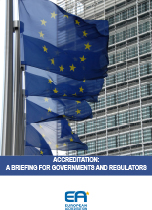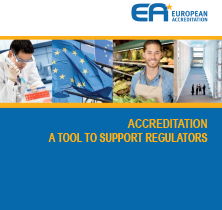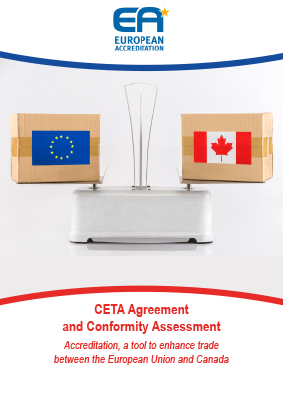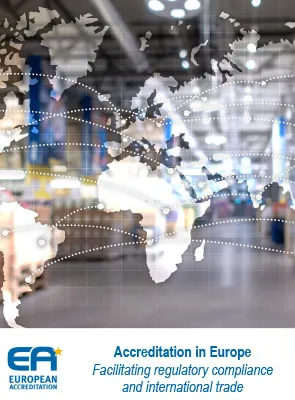What is accreditation
for Regulators?
Accreditation operates in the public interest across all market sectors. It provides an attestation that accredited bodies offering testing, examination, calibration, certification, inspection and verification services have the technical competence and impartiality to check the conformity of products and services with the relevant standards and regulations.
- helps fulfil legal requirements at reasonable costs;
- enables innovation;
- reduces the need for regulators to use their own resources;
- builds consumers’ and businesses’ confidence.
The accreditation process provides a cost-effective means of delivering public interest services which:
- are reliable and of high quality;
- support regulatory compliance;
- imply lower administrative burdens and bureaucracy.
Regulation (EC) No 765/2008 – Definition of Accreditation
‘Accreditation’ means an attestation by a National Accreditation Body that a Conformity Assessment Body meets the requirements set by harmonized standards and, where applicable, any additional requirements including those set out in relevant sectoral schemes, to carry out a specific conformity assessment activity.
REGULATORS
rely on
NATIONAL ACCREDITATION BODIES
which verify the competence of
Laboratories
Calibration
Testing
Medical
Proficency
Testing
Providers
Inspection
Bodies
Certification
Bodies
Products
Management Systems
Persons
Validation
and Verification
Bodies
Reference
Material
Producers
Which offer conformity assessment services to standards/regulatory requirements/scheme criteria
Testing, Medical Examinations, Calibration
Interlaboratory Comparisons and Proficiency-Testing Programmes
Inspection of Products, Processes, or Services and Installations or their design
Certification of Products, Management Systems, Persons, Processes or Services
Validation and
Verification
Reference Material
and Certified Reference Materials
For the benefits of
Governments
Businesses
Consumers
On the market of
Products
Services
You can find information about conformity assessment
on the ISO CASCO website
Benefits and value
Accreditation operates in the public interest across all market sectors. It provides an attestation that accredited bodies offering testing, examination, calibration, certification, inspection and verification services have the technical competence and impartiality to check the conformity of products and services with the relevant standards and regulations.
- technical competence;
- independence, impartiality and integrity;
- risk management;
- adequate use of human and equipment resources;
- mechanism for continuous improvement of product and service quality;
- complaint and appeal system.
- supporting implementation of European or national legislation, providing a “stamp of approval” showing compliance with standards and widely accepted requirements;
- qualifying suppliers of goods and services, especially on the procurement market;
- enhancing trade and economic growth;
- supporting cost efficiency, by reducing the need for regulators to employ their specialized assessment personnel and avoiding duplication of audits;
- simplifying the procurement process based on demonstrated competence and impartiality as decision-making criteria.
Example: EU Emission Trading System (ETS)
The EU ETS is a cornerstone of the EU’s policy to fight climate change and one of the key tools for reducing greenhouse gas emissions. The monitoring and reporting of greenhouse gas emissions must thereby be robust, transparent, consistent and accurate for EU ETS to operate effectively.
As a result, in 2015, EA extended its Multilateral Agreement (EA MLA) to the new scope “Greenhouse Gas Validation and Verification” after having signed a specific agreement with the Directorate-General Climate Action of the European Commission in August 2013 for the implementation of accreditation and peer evaluation of EA National Accreditation Bodies (NAB) according to EN ISO 14065 and Commission Regulation (EU) No 600/2012.
By the end of 2022, 25 EA Members are signatories to the EA MLA for the scope GHG Validation and Verification with 144 accreditations valid by then (Source: EA survey – January 2023).
For more examples of benefits,
visit the Business Benefits’
How does accreditation work?
- Competence: experience and technical skills of the staff in the accredited or applicant body are verified by qualified assessors with relevant expertise and specialized knowledge;
- Independence: accredited bodies that grant certificates or issue test reports for instance shall show independence from the organisations to which their services are provided, in terms of decision-making powers or economic and business relations for instance;
- Impartiality: accredited bodies shall show absence of or properly manage potential conflicts of interest with the client to whom they provide services. For instance, they shall not share any commercial interests.
To ensure continued compliance, National Accreditation Bodies are regularly re-assessed, through the EA MLA at European level, to ensure they:
- keep pace with technical and regulatory changes in their area of expertise;
- maintain their standards of work;
- demonstrate practical competence and sound judgement.
Accreditation gives confidence to regulators that regulations are implemented effectively for the benefit of businesses and consumers.
The process of accreditation is set out in the international standard EN ISO/IEC 17011 Conformity assessment — Requirements for National Accreditation Bodies accrediting Conformity Assessment Bodies.
For further information,
visit our “The EA MLA” page
Regulators FAQ
EA, the European cooperation for Accreditation is a not-for-profit association, registered in the Netherlands. It is formally appointed by the European Commission in Regulation (EC) No 765/2008 to develop and maintain a multilateral agreement of mutual recognition, the EA MLA, based on a harmonized accreditation infrastructure.
The EA MLA exists to facilitate fair trade, ensure product and service quality and reduce technical barriers to trade.
EA currently has 50 Members. The EA Members are National Accreditation Bodies in Europe that are officially recognized by their national governments to assess and verify – against international standards – organizations that carry out conformity assessment activities such as certification, verification, inspection, testing and calibration.
Regulation (EC) No 765/2008 and the standards of the ISO/IEC 17000 series provide the set of rules to be used by EA and its National Accreditation Bodies.
To get more information, visit the “About EA” and “Mutual Recognition” pages.
There is one National Accreditation Body (NAB) per Member State according to Regulation (EC) No 765/2008. As an authoritative body appointed by its national authorities, the National Accreditation Body performs accreditation by assessing Conformity Assessment Bodies against international standards. The accreditation process determines the technical competence and integrity of organizations that offer testing, examination, validation and verification, inspection, calibration, certification, reference material production and proficiency testing provision services (collectively known as conformity assessment). Accreditation operates in the public interest across all market sectors, providing a transparent and impartial assessment of these services against internationally recognized standards and other national or sectoral requirements.
Conformity Assessment Bodies carry out certification, testing, inspection, verification and calibration services, collectively known as conformity assessment activities.
An accredited body is a body that has successfully undergone accreditation. It means it has been assessed and a positive decision has been taken to grant accreditation for an agreed scope. The accredited body is entitled to use the National Accreditation Body mark for the scope(s) for which it has been accredited.
Whereas there is only one National Accreditation Body per Member State, there may be plenty of accredited CABs in the same Member State. The EA NAB maintains a list of accredited bodies on their website. The list is also available on the EA website, “Directory of EA Members and MLA signatories” page.
Together, conformity assessment and accreditation are important parts of a nation’s quality infrastructure, along with metrology and standardization. They build confidence that goods and services, processes, management systems and the work of individuals comply with national and international standards and regulations. They also assist in the risk-management and decision-making of manufacturers and regulators.
To get more information, visit the “Accreditation” page
The EA National Accreditation Body Members provide accreditation of:
- Laboratories
- Testing (EN ISO/IEC 17025), Medical examinations (EN ISO 15189)
- Calibration (EN ISO/IEC 17025)
- Inspection bodies (EN ISO/IEC 17020)
- Certification bodies:
- Certification of Persons (EN ISO/IEC 17024)
- Management Systems Certification (EN ISO/IEC 17021-1) (quality, environment)
- Products/Services Certification (EN ISO/IEC 17065)
- Proficiency Testing Providers (EN ISO/IEC 17043)
- Validation and Verification Bodies (EN ISO 14065) for GHG emissions
- Reference Materials Producers (EN ISO 17034)
These are the standards used for accreditation by the EA Members.
The official definition of conformity assessment is: “Demonstration that specified requirements relating to a product, process, system, person or body are fulfilled” (definition in EN ISO/IEC 17000:2004 Conformity assessment – Vocabulary and general principles).
Due to the ever-increasing technical complexity of industry and business, it is becoming more and more important to be able to demonstrate that what is being supplied actually meets the requirements specified or claimed. Such a demonstration is called conformity assessment. Conformity assessment can be applied to a product (including, for these purposes, a service), a process, a system, a body or persons, and includes activities such as testing, inspection and certification.
3rd-party assessment
Third-party assessment is the assessment of an organization performed by an independent body. The organization carrying out the assessment shall be independent of both supplier and customer organizations and deliver an impartial assessment.
Impartiality
In the field of accreditation, the impartiality rule requires that the National Accreditation Body (NAB) be impartial in making a decision on accreditation. It means that the NAB shall not have any conflict of interest with the body applying for accreditation, and that the NAB shall not be subject to any other pressure of a commercial or financial nature.
This is provided for in Article 8 of the European Commission’s Regulation (EC) 765/2008 relating to the “Requirements for NABs” which states “that a NAB shall be organized in such a manner as to make it independent of the CABs it assesses and of commercial pressures, and to ensure that no conflicts of interest with CABs occur.”
In practice, impartiality also means that the accreditation decision shall be made by persons different from those that conducted the assessment.
Non-profit-making principle
EA and its National Accreditation Body Members shall be non-profit-making and -distributing organizations in order to meet their formal obligation to act in the public interest.
As such, accreditation must be operated under the following conditions:
- at national level, with a recognized mandate from the government
- with complete independence and impartiality
- with full accountability towards all interested parties, with no single interest or group of interests predominating
- as a non-profit-distributing service activity
- without any competition
Cross-frontier accreditation
Cross-frontier accreditation refers to the principles for cooperation between EA Members in the accreditation process when accreditation is granted by a foreign National Accreditation Body i.e. by a National Accreditation Body that is not the local National Accreditation Body.
According to Regulation 765/2008 and the EA Cross-Border Accreditation Policy and Procedure for Cross-Border Cooperation between EA Members (EA-2/13), each Accreditation Body should primarily provide services to its local market. However, in exceptional cases, a National Accreditation Body may provide accreditation in a country or economy of another National Accreditation Body. In such cases, the principle of the policy is to encourage cooperation between the foreign Accreditation Bodies and the local National Accreditation Bodies, and to support local accreditation by offering the local National Accreditation Bodies the opportunity to sub-contract, participate in a joint assessment or observe the assessment.
This lies in Article 7.1 of Regulation (EC) 765/2008 providing that Conformity Assessment Bodies, whether third-party or first-party/in-house bodies, are required to request accreditation by the National Accreditation Body of the Member State in which they are established.
This general rule allows for exceptions. The option for a Conformity Assessment Body to request accreditation with a National Accreditation Body in another Member State is limited to cases where:
- there is no National Accreditation Body in its own Member State [Art. 7.1(a)]
- the National Accreditation Body does not offer the requested accreditation service [Art. 7.1(b)]
- the National Accreditation Body has not received a positive outcome in the peer evaluation in relation to the conformity assessment activity for which accreditation is requested [Article 7.1(c)]
Art. 7.1 Regulation (EC) 765/2008 is a logical consequence of the non-competition principle embodied in Article 6 of the same Regulation. It is important to prevent Conformity Assessment Bodies from shopping around for accreditation certificates, thus creating a “market for accreditation” leading to the commercialization of accreditation which jeopardizes the added value and role of accreditation as a public authority activity and last level of control in the conformity assessment chain.
To find a list of EA MLA signatories, visit the “Directory of EA Members and MLA Signatories” page.
You can also download EA-INF/03: Signatories to the EA Multilateral Agreement.
The EA contact in your country is the National Accreditation Body of your country. To find the relevant Accreditation Body, visit the “Directory of EA Members and MLA Signatories” page
The EA Multilateral Agreement (EA MLA) is a signed agreement between the EA Members whereby the signatories recognize and accept the equivalence of the accreditation systems operated by the signing members, and also the reliability of the conformity assessment results provided by Conformity Assessment Bodies (CABs) accredited by the signing members. It makes the objective ‘Accredited once, accepted everywhere’ effective.
The benefits of the EA MLA for Regulators can be summarized as follow:
- Supporting implementation of European and national legislations by confirming compliance with standards and applicable requirements;
- Enhancing trade and economic growth by giving governments confidence in accreditation and competent suppliers of goods and services;
- Limiting costs and resources by eliminating a number of administrative obligations. The EA MLA reduces the need to employ specialized assessment personnel for regulatory controls and avoids duplication of audits.
Yes but under specific conditions.
According to Regulation (EC) No 765/2008 and EA-2/13 EA Cross-Border Accreditation Policy and Procedure for Cross-Border Cooperation between EA Members, each Accreditation Body should primarily provide services to its local market. However, in exceptional cases, an Accreditation Body may provide accreditation in a country or economy of another Accreditation Body. In such cases, the principle of the policy is to encourage cooperation between the foreign Accreditation Body and the local Accreditation Body, and to support local accreditation by offering the local Accreditation Body the opportunity to sub-contract, participate in a joint assessment or observe the assessment.
This lies in Article 7.1 of Regulation (EC) No 765/2008 providing that Conformity Assessment Bodies, whether third-party or first-party/in-house bodies, are required to request accreditation by the National Accreditation Body of the Member State in which they are established.
This general rule allows for exceptions. The option for a Conformity Assessment Body to request accreditation with a NAB in another Member State is limited to cases where:
- there is no NAB in its own Member State [Art. 7.1(a)]
- the NAB does not offer the requested accreditation service [Art. 7.1(b)]
- the NAB has not received a positive outcome in the peer evaluation in relation to the conformity assessment activity for which accreditation is requested [Article 7.1(c)]
Art. 7.1 Regulation (EC) No 765/2008 is a consequence of the non-competition principle embodied in Article 6 of the same Regulation. It is important to prevent Conformity Assessment Bodies from shopping around for accreditation certificates, thus creating a “market for accreditation” leading to the commercialization of accreditation which jeopardizes the added value and role of accreditation as a public authority activity and last level of control in the conformity assessment chain.
EA encourages the use of its publications and communications materials. EA’s publications and brochures may be printed or distributed in full without need for formal permission from EA. Organizations seeking permission to translate EA publications must contact the EA Secretariat. The request for permission should clearly detail:
- the EA publication, or part thereof, for which permission is sought;
- where the translated material will appear and what it will be used for;
- any other background information that may assist EA in granting permission.
The translated document must contain a statement acknowledging EA’s ownership and copyright.
For further details, contact Amandine Combe – Marketing & Communications Manager (am************@********************on.org)
Accreditation is a decision made by the National Accreditation Body.
Notification is a decision made by the national authorities in the Member States.
Accreditation is the technical basis used by national authorities to notify a Conformity Assessment Body.
The European Commission maintains the NANDO website which lists all notified organizations across Europe.
What is accreditation for
Industries & Economies?
By using accredited services, businesses can demonstrate compliance with standards and regulations.
Accreditation provides confidence in certificates and conformity attestations. It underpins quality of results by ensuring traceability, comparability, validity and commutability.

Benefits and value
Using accredited services for businesses can:
- Make it easier and less expensive to export and access new markets because once tested or certified by an accredited body, there should be no need to re-test or re-certify a product for foreign markets;
- Be both less risky and cheaper as importing goods and services with an accredited report or certificate confirms conformity to recognized standards and can therefore also avoid the costs of re-testing;
- Be an essential tool for decision-making, risk management and supplier selection in order to contribute to the operational efficiency of businesses;
- Give a competitive advantage in domestic markets through access to public sector contracts;
- Increase the confidence of consumers who want to trust in the goods and services they buy and use.
Accreditation provides the last level of public control in a quality chain underpinning the free movement of goods in the Union.
For examples of benefits,
visit the Business Benefits’
CETA Agreement and Conformity Assessment Accreditation, a tool to enhance trade between the European Union and Canada
(2018)
Accreditation in Europe – Facilitating regulatory compliance and international trade
(2022)
How does accreditation work?
Accreditation is the result of an assessment which:
- is carried out impartially;
- is objective, transparent and effective;
- uses highly professional competent assessors and technical experts in all relevant fields.
Accredited bodies are regularly re-assessed to:
- ensure they are keeping pace with technical and regulatory changes in their area of expertise,
- maintain their standards of work.
To provide fair competition between companies which use accredited bodies, accreditation needs to be harmonized to produce comparable results. Harmonization in accreditation practices is made possible thanks to the EA Multilateral Agreement (EA MLA), the work of the EA technical committees, continuous discussions and experience sharing amongst EA Members. Stakeholder and market feedback is also regularly taken into consideration.
Accreditation is the international stamp of approval that “tested once” means “accepted everywhere”.
Regulation (EC) No 765/2008 has established a single European system which covers both the regulated domain, where accreditation is required by legislation, as well as the non-regulated sphere. Even in the latter case, where a body voluntarily wishes or regulatory has to be accredited, it can only go the National Accreditation Bodies (NAB) which operate under Regulation (EC) No 765/2008, thus avoiding the existence of competing systems, whichever principles they may be based on.
According to Regulation (EC) No 765/2008, accreditation is the preferred way to demonstrate competence and impartiality of so-called Notified Bodies.
Notified Bodies carry out the tasks pertaining to the conformity assessment procedures referred to in the applicable technical harmonization legislation when a third party is required.
Signatory National Accreditation Bodies (NAB) to the EA MLA are evaluated by their peers regularly. The objective is to maintain mutual confidence amongst signatories that accreditation delivered by one of them is as reliable as accreditation delivered by the other signatories.
In practice, accreditation enhances acceptance of products and services across borders, without needing to repeat tests and certifications, thereby creating a global infrastructure to support trade and confidence in the marketplace.
Industries & Economies FAQ
EA, the European cooperation for Accreditation is a not-for-profit association, registered in the Netherlands. It is formally appointed by the European Commission in Regulation (EC) No 765/2008 to develop and maintain a multilateral agreement of mutual recognition, the EA MLA, based on a harmonized accreditation infrastructure.
The EA MLA exists to facilitate fair trade, ensure product and service quality and reduce technical barriers to trade.
EA currently has 50 Members. The EA Members are National Accreditation Bodies in Europe that are officially recognized by their national governments to assess and verify – against international standards – organizations that carry out conformity assessment activities such as certification, verification, inspection, testing and calibration.
Regulation (EC) No 765/2008 and the standards of the ISO/IEC 17000 series provide the set of rules to be used by EA and its National Accreditation Bodies.
To get more information, visit the “About EA” and “Mutual Recognition” pages.
The official definition of conformity assessment is: “Demonstration that specified requirements relating to a product, process, system, person or body are fulfilled” (definition in EN ISO/IEC 17000:2004 Conformity assessment – Vocabulary and general principles).
Due to the ever-increasing technical complexity of industry and business, it is becoming more and more important to be able to demonstrate that what is being supplied actually meets the requirements specified or claimed. Such a demonstration is called conformity assessment. Conformity assessment can be applied to a product (including, for these purposes, a service), a process, a system, a body or persons, and includes activities such as testing, inspection and certification.
Impartiality
In the field of accreditation, the impartiality rule requires that the National Accreditation Body (NAB) be impartial in making a decision on accreditation. It means that the NAB shall not have any conflict of interest with the body applying for accreditation, and that the NAB shall not be subject to any other pressure of a commercial or financial nature.
This is provided for in Article 8 of the European Commission’s Regulation (EC) 765/2008 relating to the “Requirements for NABs” which states “that a NAB shall be organized in such a manner as to make it independent of the CABs it assesses and of commercial pressures, and to ensure that no conflicts of interest with CABs occur.”
In practice, impartiality also means that the accreditation decision shall be made by persons different from those that conducted the assessment.
Non-profit-making principle
EA and its National Accreditation Body Members shall be non-profit-making and -distributing organizations in order to meet their formal obligation to act in the public interest.
As such, accreditation must be operated under the following conditions:
- at national level, with a recognized mandate from the government
- with complete independence and impartiality
- with full accountability towards all interested parties, with no single interest or group of interests predominating
- as a non-profit-distributing service activity
- without any competition
Cross-frontier accreditation
Cross-frontier accreditation refers to the principles for cooperation between EA Members in the accreditation process when accreditation is granted by a foreign National Accreditation Body i.e. by a National Accreditation Body that is not the local National Accreditation Body.
According to Regulation 765/2008 and the EA Cross-Border Accreditation Policy and Procedure for Cross-Border Cooperation between EA Members (EA-2/13), each Accreditation Body should primarily provide services to its local market. However, in exceptional cases, a National Accreditation Body may provide accreditation in a country or economy of another National Accreditation Body. In such cases, the principle of the policy is to encourage cooperation between the foreign Accreditation Bodies and the local National Accreditation Bodies, and to support local accreditation by offering the local National Accreditation Bodies the opportunity to sub-contract, participate in a joint assessment or observe the assessment.
This lies in Article 7.1 of Regulation (EC) 765/2008 providing that Conformity Assessment Bodies, whether third-party or first-party/in-house bodies, are required to request accreditation by the National Accreditation Body of the Member State in which they are established.
This general rule allows for exceptions. The option for a Conformity Assessment Body to request accreditation with a National Accreditation Body in another Member State is limited to cases where:
- there is no National Accreditation Body in its own Member State [Art. 7.1(a)]
- the National Accreditation Body does not offer the requested accreditation service [Art. 7.1(b)]
- the National Accreditation Body has not received a positive outcome in the peer evaluation in relation to the conformity assessment activity for which accreditation is requested [Article 7.1(c)]
Art. 7.1 Regulation (EC) 765/2008 is a logical consequence of the non-competition principle embodied in Article 6 of the same Regulation. It is important to prevent Conformity Assessment Bodies from shopping around for accreditation certificates, thus creating a “market for accreditation” leading to the commercialization of accreditation which jeopardizes the added value and role of accreditation as a public authority activity and last level of control in the conformity assessment chain.
The EA Multilateral Agreement (EA MLA) is a signed agreement between the EA Members whereby the signatories recognize and accept the equivalence of the accreditation systems operated by the signing members, and also the reliability of the conformity assessment results provided by Conformity Assessment Bodies (CABs) accredited by the signing members. It makes the objective ‘Accredited once, accepted everywhere’ effective.
The benefits of the EA MLA for Industry can be summarized as follow:
- Boosting competitiveness: with the EA MLA, businesses can differentiate their services by providing objective evidence of technical competence, impartiality and compliance with international requirements and avoid the costs of re-testing;
- Reducing controls and increasing quality: importing goods and services with an EA MLA accredited report or certificate can be both less risky and cheaper as businesses do not need to provide additional evidence;
- Tested once, accepted everywhere: Members States have to accept a certificate issued by a Notifiy Body, even if the Notified Body is established in a different Member State
Supporting export: as the EA MLA is recognized internationally, its opens new opportunities on the global market by eliminating barriers to trade.
To find a list of EA MLA signatories, visit the “Directory of EA Members and MLA Signatories” page.
You can also download EA-INF/03: Signatories to the EA Multilateral Agreement.
To confirm the validity of reports from Conformity Assessment Bodies, you should refer in the first instance to the Body that issued the report.
The certificate shall bear the accreditation mark of the Accreditation Body that accredited the Conformity Assessment Body.
Then you must check that the Accreditation Body is a signatory to the EA MLA for the activity you are interested in. For instance, if you need a test report covered by accreditation and the EA MLA, you should check that the report contains a reference to accreditation, an accreditation mark, and an accreditation number; you should also check that the Accreditation Body that granted accreditation is a signatory to the EA MLA for testing.
To find the Accreditation Body, visit the “Directory of EA Members and MLA Signatories” page.
- Check that there is an accreditation mark on the report or certificate.
- Check that the accreditation mark is of an Accreditation Body signatory to the EA, ILAC or IAF MLA.
- Check that your supplier is accredited for the competence, the tests and the results you need.
- Check that the tests have been carried out against international standards. Alternatively, check that the standards and methods used can be accepted in the country of destination.
- In case of problems, contact the National Accreditation Body.
EA itself does not undertake any calibration, testing, certification, inspection or verification activities and therefore does not issue any reports.
Testing, calibration, certification, inspection and verification are conformity assessment services performed by Conformity Assessment Bodies, laboratories or inspection, verification or certification bodies.
To find an accredited CAB, visit the “Directory of EA Members and MLA Signatories” page and search for the National Accreditation Body and the scope you are interested in.
Complaints shall first be lodged with the Accreditation Body that accredited the Conformity Assessment Body in question.
It is only when the complaint process at NAB level has been exhausted that EA will consider a complaint at EA level.
Complaints and appeals received may concern decisions and activities of EA or EA Members, or Conformity Assessment Bodies accredited by EA Members.
All complaints must be addressed in writing in English to the EA Secretariat by email (se*********@********************on.org) or ground mail (European co-operation for Accreditation -75 avenue Parmentier 75011 Paris – France).
EA considers all complaints and appeals as a possible opportunity to improve its services and implement corrective and preventive action measures.
For further information, read EA-1/17 S3 A EA Procedure For the investigation and Resolution of Complaints and Appeals
EA encourages the use of its publications and communications materials. EA’s publications and brochures may be printed or distributed in full without need for formal permission from EA. Organizations seeking permission to translate EA publications must contact the EA Secretariat. The request for permission should clearly detail:
- the EA publication, or part thereof, for which permission is sought;
- where the translated material will appear and what it will be used for;
- any other background information that may assist EA in granting permission.
The translated document must contain a statement acknowledging EA’s ownership and copyright.
For further details, contact Amandine Combe – Marketing & Communications Manager (am************@********************on.org)
Accreditation is a decision made by the National Accreditation Body.
Notification is a decision made by the national authorities in the Member States.
Accreditation is the technical basis used by national authorities to notify a Conformity Assessment Body.
The European Commission maintains the NANDO website which lists all notified organizations across Europe.
What is accreditation for Conformity Assessment Bodies?
Accreditation determines the technical competence, integrity and impartiality of organizations providing conformity assessment services such as testing, calibration, certification, and inspection based on international standards.
Accreditation is an impartial and objective process that provides the least duplicative, the most transparent and the most widely accepted route for providing trustworthy conformity assessment results.
Accreditation:
- is the formal demonstration of Conformity Assessment Bodies’ competence to carry out specific conformity assessment tasks (EN ISO/IEC 17000 series);
- is the independent and authoritative attestation of the competence, impartiality and integrity of Conformity Assessment Bodies;
- is the “passport” for international trade based on multilateral agreements;
- supports harmonization of conformity assessment procedures at worldwide level;
- is a requirement to operate in regulated areas, on the national and international level.
Benefits and value
When they are accredited, Conformity Assessment Bodies can benefit from:
Using accredited services for businesses can:
- better visibility on the market; EA and its National Accreditation Body Members publish directories of accredited organizations;
- international recognition through the EA MLA (the multilateral agreement on mutual recognition between EA Members) which enables reports and certificates to be more readily accepted in overseas markets.
Accreditation is an effective tool. It is a passport for submitting tenders to contractors that require independently verified organizations, and guarantees their impartiality and competence.
Accreditation provides the last level of public control in a quality chain underpinning the free movement of goods in the Union.
How does accreditation work?
Accreditation is a process aiming to demonstrate compliance with specified requirements for competence, independence and impartiality:
- Competence: experience and technical skills of the staff are verified by qualified assessors with relevant expertise and specialized knowledge;
- Independence: Conformity Assessment Bodies that grant certificates or issue test reports for instance shall show independence from the organizations to which their services are provided, in terms of decision-making powers or economic and business relations for instance;
- Impartiality: Conformity Assessment Bodies shall show absence of or properly manage potential conflicts of interest with the client to whom they provide services. For instance, they shall not share any commercial interests with their customers.
To ensure continued compliance, Conformity Assessment Bodies are regularly re-assessed to ensure they continuously:
- keep pace with technical and regulatory changes in their area of expertise;
- maintain their standards of work;
- demonstrate practical competence and sound judgement.
Conformity Assessment Bodies FAQ
EA, the European cooperation for Accreditation is a not-for-profit association, registered in the Netherlands. It is formally appointed by the European Commission in Regulation (EC) No 765/2008 to develop and maintain a multilateral agreement of mutual recognition, the EA MLA, based on a harmonized accreditation infrastructure.
The EA MLA exists to facilitate fair trade, ensure product and service quality and reduce technical barriers to trade.
EA currently has 50 Members. The EA Members are National Accreditation Bodies in Europe that are officially recognized by their national governments to assess and verify – against international standards – organizations that carry out conformity assessment activities such as certification, verification, inspection, testing and calibration.
Regulation (EC) No 765/2008 and the standards of the ISO/IEC 17000 series provide the set of rules to be used by EA and its National Accreditation Bodies.
To get more information, visit the “About EA” and “Mutual Recognition” pages.
Impartiality
In the field of accreditation, the impartiality rule requires that the National Accreditation Body (NAB) be impartial in making a decision on accreditation. It means that the NAB shall not have any conflict of interest with the body applying for accreditation, and that the NAB shall not be subject to any other pressure of a commercial or financial nature.
This is provided for in Article 8 of the European Commission’s Regulation (EC) 765/2008 relating to the “Requirements for NABs” which states “that a NAB shall be organized in such a manner as to make it independent of the CABs it assesses and of commercial pressures, and to ensure that no conflicts of interest with CABs occur.”
In practice, impartiality also means that the accreditation decision shall be made by persons different from those that conducted the assessment.
Non-profit-making principle
EA and its National Accreditation Body Members shall be non-profit-making and -distributing organizations in order to meet their formal obligation to act in the public interest.
As such, accreditation must be operated under the following conditions:
- at national level, with a recognized mandate from the government
- with complete independence and impartiality
- with full accountability towards all interested parties, with no single interest or group of interests predominating
- as a non-profit-distributing service activity
- without any competition
Cross-frontier accreditation
Cross-frontier accreditation refers to the principles for cooperation between EA Members in the accreditation process when accreditation is granted by a foreign National Accreditation Body i.e. by a National Accreditation Body that is not the local National Accreditation Body.
According to Regulation 765/2008 and the EA Cross-Border Accreditation Policy and Procedure for Cross-Border Cooperation between EA Members (EA-2/13), each Accreditation Body should primarily provide services to its local market. However, in exceptional cases, a National Accreditation Body may provide accreditation in a country or economy of another National Accreditation Body. In such cases, the principle of the policy is to encourage cooperation between the foreign Accreditation Bodies and the local National Accreditation Bodies, and to support local accreditation by offering the local National Accreditation Bodies the opportunity to sub-contract, participate in a joint assessment or observe the assessment.
This lies in Article 7.1 of Regulation (EC) 765/2008 providing that Conformity Assessment Bodies, whether third-party or first-party/in-house bodies, are required to request accreditation by the National Accreditation Body of the Member State in which they are established.
This general rule allows for exceptions. The option for a Conformity Assessment Body to request accreditation with a National Accreditation Body in another Member State is limited to cases where:
- there is no National Accreditation Body in its own Member State [Art. 7.1(a)]
- the National Accreditation Body does not offer the requested accreditation service [Art. 7.1(b)]
- the National Accreditation Body has not received a positive outcome in the peer evaluation in relation to the conformity assessment activity for which accreditation is requested [Article 7.1(c)]
Art. 7.1 Regulation (EC) 765/2008 is a logical consequence of the non-competition principle embodied in Article 6 of the same Regulation. It is important to prevent Conformity Assessment Bodies from shopping around for accreditation certificates, thus creating a “market for accreditation” leading to the commercialization of accreditation which jeopardizes the added value and role of accreditation as a public authority activity and last level of control in the conformity assessment chain.
Yes but under specific conditions.
According to Regulation 765 and EA-2/13 EA Cross-Border Accreditation Policy and Procedure for Cross-Border Cooperation between EA Members, each National Accreditation Body (NAB) should primarily provide services to its local market. However, in exceptional cases, a National Accreditation Body (NAB) may provide accreditation in a country or economy of another National Accreditation Body. In such cases, the principle of the policy is to encourage cooperation between the foreign National Accreditation Body (NAB) and the local National Accreditation Body, and to support local accreditation by offering the local Accreditation Body the opportunity to sub-contract, participate in a joint assessment or observe the assessment.
This lies in Article 7.1 of Regulation (EC) 765/2008 providing that Conformity Assessment Bodies, whether third-party or first-party/in-house bodies, are required to request accreditation by the National Accreditation Body of the Member State in which they are established.
This general rule allows for exceptions. The option for a Conformity Assessment Body to request accreditation with a NAB in another Member State is limited to cases where:
- there is no NAB in its own Member State [Art. 7.1(a)]
- the NAB does not offer the requested accreditation service [Art. 7.1(b)]
- the NAB has not received a positive outcome in the peer evaluation in relation to the conformity assessment activity for which accreditation is requested [Article 7.1(c)]
Art. 7.1 Regulation (EC) 765/2008 is a consequence of the non-competition principle embodied in Article 6 of the same Regulation. It is important to prevent Conformity Assessment Bodies from shopping around for accreditation certificates, thus creating a “market for accreditation” leading to the commercialization of accreditation which jeopardizes the added value and role of accreditation as a public authority activity and last level of control in the conformity assessment chain.
EA does not accredit. It is an organization of National Accreditation Bodies (NAB) involved in the accreditation of laboratories and certification and inspection bodies. It is these Accreditation Bodies that accredit. EA assesses it Accreditation Body Members for them to become or remain a signatory to the EA MLA.
You should contact your National Accreditation Body to apply for accreditation.
To find the National Accreditation Body in your country, visit the “Directory of EA Members and MLA Signatories” page
EA offers training courses for its Members only.
EA National Accreditation Body (NAB) Members develop training programs. You can contact them directly or consult their websites.
To find the relevant National Accreditation Body, visit the “Directory of EA Members and MLA Signatories” page
Complaints and appeals received may concern decisions and activities of EA or EA Members, or Conformity Assessment Bodies accredited by EA Members.
All complaints must be addressed in writing in English to the EA Secretariat by email (se*********@********************on.org) or ground mail (European co-operation for Accreditation – 75 avenue Parmentier 75011 Paris – France).
EA considers all complaints and appeals as a possible opportunity to improve its services and implement corrective and preventive action measures.
For further information, read EA-1/17 S3 A: EA Procedure For the investigation and Resolution of Complaints and Appeals.
EA’s logo is not a registered trademark and cannot be used on reports or certificates.
Its use is restricted to EA itself, EA Accreditation Body Members and Recognized Stakeholder Members under specific conditions.
Rules for use of the EA logo are set out in EA-1/19 Rules for use of EA logo and Graphic specifications. If misuse is detected, EA is entitled to and will take appropriate action up to and including legal action.
EA encourages the use of its publications and communications materials.
EA’s publications and brochures may be printed or distributed in full without need for formal permission from EA.
Organizations seeking permission to translate EA publications must contact the EA Secretariat. The request for permission should clearly detail:
- the EA publication, or part thereof, for which permission is sought;
- where the translated material will appear and what it will be used for;
- any other background information that may assist EA in granting permission.
The translated document must contain a statement acknowledging EA’s ownership and copyright.
For further details, contact Amandine Combe – Marketing & Communications Manager (am************@********************on.org)
What is accreditation for
Consumers & Citizens?
Consumers want to have confidence in the goods and services they buy and use. Accreditation exists to give that confidence.
How is this possible?
Products are manufactured and food is supplied in conformity with specific quality, security or safety requirements.
Laboratories or certifiers check and confirm that conformity.
Reports and certificates that go with products or services can be trusted readily when they are issued by accredited laboratories or certifiers.
Accreditation is indeed the proof that the laboratory or certifier is:
- impartial and independent from the manufacturer or supplier;
- competent, to do its job in a sustainable manner.
Confidence in the products and services, irrespective of where they come from, is based on accreditation thanks to the existing multilateral agreements signed by National Accreditation Bodies (NABs) in Europe and at worldwide level.
When signatories recognize that the accreditation they deliver can be trusted equally, it means that products do not need to be re-tested or re-certified on every new market: tested once, certified once by an accredited laboratories or certifier means acceptable everywhere!
Through accreditation and harmonized application of standards, consumers can therefore have confidence in the products and services they purchase on the European market.
Benefits and value
Here are a few examples to illustrate how accreditation positively impacts your day-to-day life:

Ensuring the effective use of CCTV (remote surveillance) through accredited certification
The UK Government has introduced a surveillance camera code of practice that contains 12 guiding principles to ensure and demonstrate to communities that cameras are only ever used proportionately, transparently and effectively by the relevant authorities (police, police crime commissioners, local authorities and non-regular police forces). Accredited third-party certification enables organizations to clearly demonstrate that they comply with the surveillance camera code of practice. Certification indicates best practice and compliance with the code.

Residential Care Home inspection
Accredited inspection for residential care homes raises standards, resulting in improved social care, and provides independent affirmation that the care provider is compliant with the rigorous standards used by the accredited inspection body.
Inspection bodies are assessed against the internationally recognized inspection standard EN ISO/IEC 17020 to carry out inspections of social care providers.
The inspections focus on competence, impartiality and performance capability to assure patients and their families of the high quality of care provided by residential care homes.

Microgeneration for the home
Consumers seeking reassurance on the suitability of renewable energy products and installers can take confidence from accreditation. Products such as wind turbines or PPV Solar panels are tested in an accredited laboratory to measure performance, durability, safety and environmentally friendly considerations. Installation companies gain accredited certification to demonstrate compliance.
How does accreditation work?
National Accreditation Bodies (NABs) perform assessments of laboratories and certification, verification or inspection bodies (the generic term for these bodies is Conformity Assessment Bodies) in order to confirm their technical competence and impartiality to perform tests, measures, certifications, inspection, verification.
Accreditation:
- delivers the objective proof that conformity assessment activities are provided by competent services suppliers;
- helps to ensure that products and services marketed in Europe meet relevant standards of quality and safety.
Accreditation increases the range of safe goods and services available on the market.
Consumers & Citizens FAQ
If you detect that a product does not have the quality characteristics claimed and marketed, you should complain to the manufacturer first. You may also contact the certification body or laboratory that certified or tested the product. Their name will appear on the product or its packaging or on the manufacturer’s website.
For other issues related to application of law and a breach of law, you should contact the relevant ministry or governmental body in charge in your country.
Further information is available on the European Commission’s website:
- About Accreditation of Conformity Assessment Bodies : https://ec.europa.eu/growth/single-market/goods/building-blocks/accreditation_en
- About Notified Bodies : https://ec.europa.eu/growth/single-market/goods/building-blocks/notified-bodies_en
- About Harmonized Standards : https://ec.europa.eu/growth/single-market/european-standards/harmonised-standards_en
Presumption of proof that a product complies with regulatory requirements
A harmonized standard is a European standard developed by a recognized European Standards Organization: CEN, CENELEC, or ETSI. It is created following a request from the European Commission to one of these organizations. Manufacturers, other economic operators, or Conformity Assessment Bodies can use harmonized standards to demonstrate that products, services, or processes comply with relevant EU legislation.
The references of harmonized standards must be published in the Official Journal of the European Union. The purpose of this website is to provide access to the latest lists of references of harmonized standards and other European standards published in the Official Journal of the European Union (OJEU).





